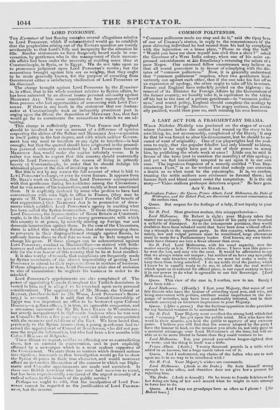LORD PONSONBY.
THE _Examiner of last Sunday contains several allegations relative to Lord PONSONBY, which if substantiated would go to establish that the perplexities arising out of the Eastern question are mainly attributable to that Lord's folly and incapacity for the situation he fills. Similar statements we have frequently heard made in con- versation, by gentlemen who in the management of their mercan- tile affairs had been under the necessity of residing some time at Constantinople, in Syria, or in Egypt. We do not take upon us to pronounce judgment upon Lord Pomo:site's merits ; but the accusations brought against him are so weighty, that they ought to be made generally known, for the purpose of eetorting from Government either a satisfactory vindication of Lord PONSONBY or his dismissal.
The charge brought against Lord PONSONBY by the Examiner is, in effect, that in his whole conduct relative to Syrian affairs, he has been animated by an almost insane personal animosity against MEHEMET Am. The same assertion we have repeatedly heard from persons who had opportunities of conversing with Lord Pox- SONBY. If there is any truth in the statement that our Ambas- sador at Constantinople took an indecently prominent part in urging upon the Divan the deposition of MEHEMET ALT, that fact would go far to corroborate the accusations to which we are ad- ert i ng. . This charge is sufficiently grave. That France and England should be involved in war on account of a difference of opinion respecting the claims of the Sultan and MEHEMET ALI—a question in itself paltry in the last degree, and with which neither Govern- ment has any need to interfere or any right to interfere—is bad enough; but that the quarrel should have originated in the ground- less personal enimosity entertained by Lord PONSONDY towards AIEHEMET Ars, would make the matter infinitely worse. It is rather too much to expect that this country should contentedly provide Lord PONSONEY with the means of living in princely luxury at Constantinople, in order that he should indulge Ids whimsical piques at the risk of involving us in war. • But this is not by any means the full amount of what is laid to Lerd PoNsoene's charge, or even its worst feature. It appears from Mr. BELL'S work on Cireassia, that Lord PONSONBY corresponded with that gentleman during his residence among the Cireassians ; that he was aware of his transactions, and tacitly at least sanctioned them. It is explicitly declared by some who profess to have had conversations with men high in office in France, (they may be agents of M. THIERS—WO give Lord PONSONBY the full benefit of that supposition,) that MEHEMET Ara is in possession of docu- ments which establiell Lord PONSONBY'S agency in exciting what has been called the Syrian insurrection. If these charges are true, Lord PON6ONDY, the representative of Great Britain at Constanti- nople, is in the habit of seeking to annoy governments with which this country is at peace, by covertly stirring up foreign war and domestic insurrection against them. In the case of the Circassians, there is added this revolting feature, that after encouraging them to persevere in their disproportioned struggle against Russia, he callously leaves them to their fate as soon SS he feels tempted to change his game. If these Charges can be substantiated against Lord PONSONBY, conduct so Machiavellian—so stained with faith- lessness and callouenese to human suffering—renders it indispens- able for the true honour of this country that he be at least recalled.
It is also worthy of remark, that complaints are frequently made by Syrian merchants, of the almost impossibility of getting Lord Poesosne to attend to their repesentations in matters of business. If these allegations are true, Lord Poesoenr adds sins of omission to sins of commission : he neglects his business in order to do mischief.
Lord PONSONItY'S appointments arc else complained of. The power of appointing Consuls throughout the Turkish dominions is vested in him, and is alleged to be exercised upon mere personal considerations. The appointment of Mr. Moone, the Consul at Beyrout, (brother-in-law to Mr. Woon, Lord PosisoNey's Secre- tary,) is censured. It is said that the Consul-Generalship of Egypt was too important an office to be bestowed upon Colonel Honoes,—a gallant officer, it is true' an agreeable companion, and a strenuous canvasser for Sir De LACY EVANS in Westminster ; but utterly inexperienced in diplemetic business when he was sent as Consul to Servia a few y cers ;tee, and still utterly unacquainted with the inatmers and reletimia Cr the East. We have heard that, previously to the Syrian insurees. thin, a young gentleman had re- ceived the appoiremeet of Consul at Scanderoon, rho did not pos- sess the requisite information, but who had been a few months with Colonel Ilomees et Belgrade.
These things we repeat, neither as affirming nor as contradicting them, but us curreet in conversation, and in part explicitly affirmed by a newspaper which is a most zealous supporter of the Coverument. We state them as matters which demand serious investigation ; inasmuch as that investigation would go far to show the Syrian di fiutes in their true character, and would moreover afford an iretructive illustretion of the manlier in which our Diplo- matic and Cmisular appointments are made and exercised. Is there one British merchant who has ever had occasion to travel, but has been ce.periteeetally convinced of' the urgent necessity of a radical refisrin ill this branch of the public service ?
Perhaps we ought to add, that the inculpation of Lord PON SON1SY cannot be regarded as the justification of Lord Pesmett- rime, but the reverse.


























 Previous page
Previous page